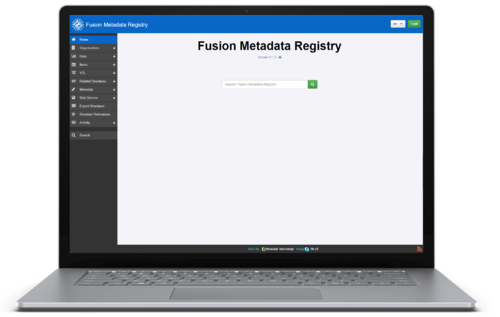Difference between revisions of "Main Page"
Jump to navigation
Jump to search
(→Fusion Metadata Registry 10) |
(→SDMX 2.1 Theory) |
||
| Line 63: | Line 63: | ||
| [[:Category:SDMX Structures|SDMX 2.1 Structures Reference]] || Details on each of the key 'maintainable' and 'identifiable' SDMX structures | | [[:Category:SDMX Structures|SDMX 2.1 Structures Reference]] || Details on each of the key 'maintainable' and 'identifiable' SDMX structures | ||
|- | |- | ||
| − | | [[:Category:FMR_Formats_Reference|Formats Reference]] || Details on each of the data and structure formats available in Fusion Metadata Registry including XML, JSON and CSV | + | | [[:Category:FMR_Formats_Reference|SDMX 2.1 Formats Reference]] || Details on each of the data and structure formats available in Fusion Metadata Registry including XML, JSON and CSV |
|- | |- | ||
| − | | [[:Category:FMR_REST_API_Reference|REST API Web Services Reference]] || Purpose, parameters, request content and response content for each of the published web services together with examples | + | | [[:Category:FMR_REST_API_Reference|SDMX 2.1 REST API Web Services Reference]] || Purpose, parameters, request content and response content for each of the published web services together with examples |
|} | |} | ||
Revision as of 02:51, 18 May 2022
Fusion Metadata Registry (FMR) Knowledge Base
Change Log and Supported Features
Change Log for details of the latest version, bug fixes and updates
Fusion Metadata Registry 11
Fusion Metadata Registry 11 implements the SDMX 3.0 specification for a structural metadata registry.
| Upgrading From Version 10 to Version 11 | Upgrading from FMR 10 to FMR 11. |
| FMR 11.0 release notes | December 2021 FMR 11.0 release. |
Using Fusion Metadata Registry 11
| Quick Start Guide | Install and configure a basic FMR installation |
| How to Guides | Guidance on specific tasks using FMR |
| Configuration Reference | Configuring FMR |
| Structural Metadata Management | Creating and maintaining SDMX structures using the FMR web user interface |
SDMX 3.0 Theory
| Concepts Reference | Explanation of key concepts and terms used in SDMX |
| Structures Reference | Details on each of the key 'maintainable' and 'identifiable' SDMX structures |
| Formats Reference | Details on each of the data and structure formats available in Fusion Metadata Registry including XML, JSON and CSV |
| REST API Web Services Reference | Purpose, parameters, request content and response content for each of the published web services together with examples |
Fusion Metadata Registry 10
Fusion Metadata Registry 10 implements the SDMX 2.1 specification for a structural metadata registry.
Using Fusion Metadata Registry 10
| Quick Start Guide | Install and configure a basic FMR installation |
| How to Guides | Guidance on specific tasks using FMR |
| Configuration Reference | Configuring FMR |
| Structural Metadata Management | Creating and maintaining SDMX structures using the FMR web user interface |
SDMX 2.1 Theory
| Concepts Reference | Explanation of key concepts and terms used in SDMX |
| SDMX 2.1 Structures Reference | Details on each of the key 'maintainable' and 'identifiable' SDMX structures |
| SDMX 2.1 Formats Reference | Details on each of the data and structure formats available in Fusion Metadata Registry including XML, JSON and CSV |
| SDMX 2.1 REST API Web Services Reference | Purpose, parameters, request content and response content for each of the published web services together with examples |
About Fusion Metadata Registry
Key Features
- SDMX structural metadata registry
- Information model: FMR 10 = SDMX 2.1, FMR 11 = SDMX 3.0
- Formats: SDMX-EDI, SDMX-ML 1.0, 2.0, 2.1, 3.0, SDMX-JSON, SDMX-CSV (data)
- SDMX REST structure API
- Web user interface for browsing, authoring and maintaining structures
Use Cases
Structural metadata management
- Centralise and control structural metadata
- Author and maintain structural metadata
- Drive statistics production using centrally-controlled metadata
- Provide an SDMX-compliant a REST structure API
Data collection
- Collect data using metadata-driven Excel forms
- Map (transform) incoming data into standardised structures
Data reporting
- Validate prepared data for compliance with the data collector's specifications prior to reporting
- Map (transform) outgoing data into the collector's required structure
Statistics production
- Data processing execution engine: data structural validation, mapping to different structures and conversion
